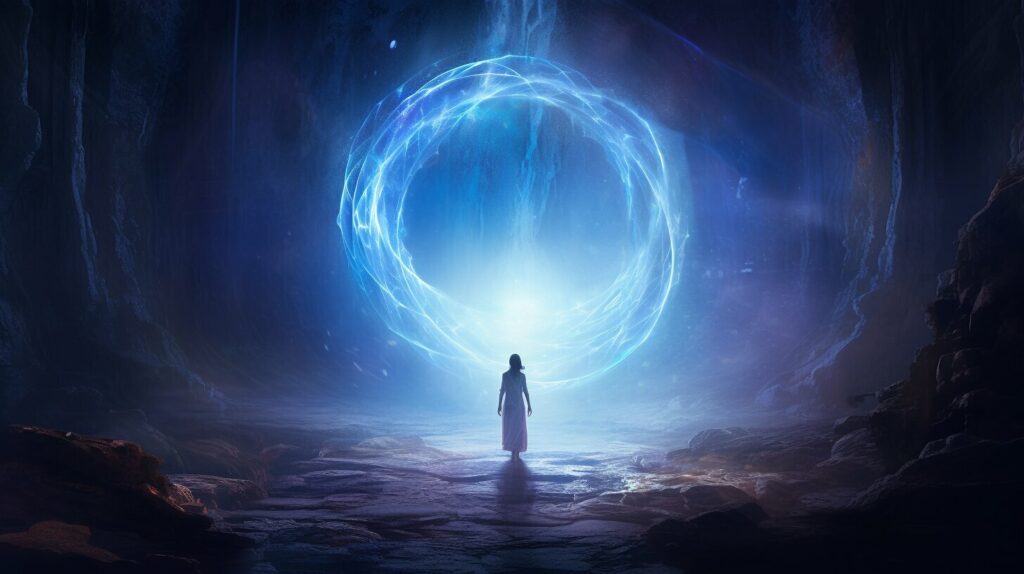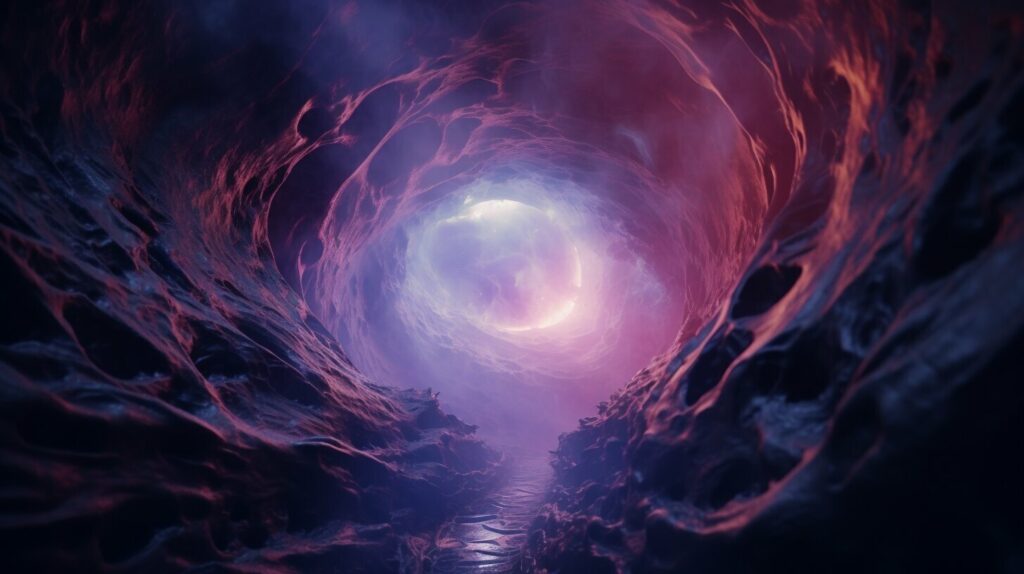Have you ever had a lucid dream? It’s a type of dream where you are consciously aware that you are dreaming and can control the dream’s outcome. It’s a fascinating and mysterious phenomenon that has sparked the curiosity of many. One question that often comes up is what happens if you die in a lucid dream?
This topic has been explored in various ways, from spiritual interpretations to scientific studies. In this article, I will delve into the experience of dying in a lucid dream and its potential consequences. We’ll also explore the afterlife within lucid dreams, the psychological effects of encountering death in a dream, and techniques for managing challenging dream scenarios.
Key Takeaways:
- Lucid dreaming is a state of consciousness where you are aware that you are dreaming.
- Many people wonder what happens if they die in a lucid dream.
- This article will explore the experience of dying in a lucid dream, the afterlife within lucid dreams, and techniques for managing challenging dream scenarios.
Exploring the Lucid Dreaming Phenomenon
Have you ever been aware that you were dreaming? This is the basis of lucid dreaming, an experience where the dreamer is conscious during the dream state. Unlike ordinary dreaming, lucid dreaming allows for a greater sense of control and awareness within the dream.
Lucid dreaming has fascinated individuals for centuries, with many exploring its possibilities and consequences. One of the most intriguing aspects of lucid dreaming is the concept of death within dreams. What happens if you die in a lucid dream? Is there an afterlife within the dream state?

These questions have sparked fascination and curiosity among lucid dreamers and researchers alike. While traditional dreaming often involves fear and confusion surrounding death, lucid dreaming allows for a more conscious exploration of this topic.
Exploring the Lucid Dreaming Experience
The lucid dreaming experience allows for a greater sense of control within the dream state. This can range from manipulating the dream environment to interacting with dream characters. Many individuals have reported encountering a sense of mortality within lucid dreams, either through experiencing death themselves or witnessing the death of dream characters.
While the experience of death within a lucid dream can be emotionally challenging, it also offers a unique opportunity for exploration and reflection. In a lucid dream, one can confront their fear of death, contemplate its meaning, or explore the concept of an afterlife within the dream state.
Lucid Dreaming and Afterlife Exploration
The concept of death within a lucid dream has also led to discussions on the afterlife within lucid dreams. Some lucid dreamers have reported encountering a spiritual realm or alternate dimension within their dreams, which they interpret as the afterlife.
While these experiences are subjective and open to interpretation, they offer a unique opportunity for exploring personal spirituality and beliefs. As with any aspect of lucid dreaming, the exploration of the afterlife within dreams is a deeply personal and individual experience.
“Lucid dreaming has opened up a whole new world of exploration and self-discovery for me. The ability to confront my fear of death within a dream has been both challenging and liberating.”
The Possibility of Mortality within Lucid Dreams
Despite the sense of control and awareness within lucid dreams, the experience of death within a dream can still be jarring and unpredictable. Some lucid dreamers have reported feeling a sense of mortality within their dreams, knowing that their time within the dream state is limited.
While this sense of mortality can be unsettling, it also adds to the richness and complexity of the lucid dreaming experience. It forces individuals to fully embrace the present moment within the dream, knowing that it will soon come to an end.
Conclusion
The phenomenon of lucid dreaming offers a unique platform for exploring the concept of death within dreams. From afterlife exploration to personal growth and reflection, encountering death within a lucid dream can be a powerful and transformative experience.
The Experience of Dying in a Lucid Dream
As a lucid dreamer, I have had my fair share of encounters with death within dreams. While some people may find the concept of dying in a dream terrifying, for me it has been a source of curiosity and exploration. Through my experiences and those of others, I have come to understand how encountering death in a lucid dream can have a profound impact on one’s emotions and psyche.
One particular experience I had involved being chased by a group of beings and ultimately being killed. As I lay dying in the dream, I felt myself slowly drifting away and waking up in my bed. The experience left me with a sense of unease and discomfort, as if I had just witnessed something I was not supposed to see.
Others have reported similar experiences of dying in a lucid dream and waking up feeling unsettled. Some individuals have described feeling a sense of loss or grief upon waking up, as if they had truly lost something or someone.
The Emotional and Psychological Impact
The emotional and psychological impact of dying in a lucid dream can vary greatly from person to person. For some, the experience may be exhilarating and even empowering, as they confront their fears and gain a sense of control over their dreams. For others, it may be a source of anxiety, fear, or existential contemplation.
One study conducted by the University of Lincoln found that individuals who frequently experienced lucid dreams reported higher levels of mental well-being and lower levels of stress and anxiety. However, the same study also found that those who experienced negative dream situations, such as death or physical injury, reported higher levels of stress and anxiety in their waking lives.
Overall, the experience of dying in a lucid dream can be a complex and multifaceted one, with a variety of emotional and psychological impacts.

“Death is a stripping away of all that is not you. The secret of life is to ‘die before you die’ – and find that there is no death.” – Eckhart Tolle
Understanding the Afterlife in Lucid Dreams
One of the most fascinating aspects of lucid dreaming is the exploration of the afterlife within dreams. For some, the concept of death in a lucid dream may spark curiosity about what lies beyond our physical reality.
While the afterlife may be perceived differently by individuals, it is not uncommon for lucid dreamers to encounter visions or experiences that align with their personal beliefs or cultural traditions. Some may experience a sense of peace and transcendence, while others may encounter frightening or unsettling scenarios.
According to dream researcher Clare Johnson, author of “Llewellyn’s Complete Book of Lucid Dreaming”, the afterlife in lucid dreams can reflect our subconscious beliefs and fears. In her book, Johnson shares stories of individuals who have experienced the afterlife in lucid dreams, including encounters with deceased loved ones, past lives, and spiritual realms.
| Experience | Interpretation |
|---|---|
| A bright light at the end of a tunnel | A symbol of transition to a new phase of life |
| A reunion with a deceased loved one | A representation of closure or unfinished emotional business |
| A frightening underworld | A manifestation of personal fears or unresolved trauma |
While some may view these experiences as purely imaginative, others see them as spiritual or metaphysical. Regardless of personal beliefs, the exploration of the afterlife within lucid dreams can offer a unique opportunity for introspection and self-discovery.

As we continue to unravel the mysteries of lucid dreaming, it’s clear that the concept of death within dreams can offer a wealth of insight and exploration. Whether we encounter the afterlife as a peaceful realm or a dark underworld, these experiences can provide a deeper understanding of our subconscious beliefs, fears, and desires.
Is There a Sense of Mortality in Lucid Dreams?
As I explored the topic of dying in lucid dreams, I couldn’t help but wonder if those who experience it also face a sense of mortality within their dream state. Is there an awareness that the consequences of dying in this dream world might not be limited to the dream alone?
Studies have shown that individuals in lucid dreams often show heightened self-awareness and control over their actions in the dream. Could this extend to an understanding of the potential consequences of their choices as well?
“In my lucid dream, I knew I had the power to control the world around me, but I also had a sense of responsibility for my actions. I knew that if I died, I might not wake up.
One participant in a lucid dream study shared this insight, suggesting that even within the dream state, there may be a recognition of the potential risks involved in confronting mortality.
However, it’s also possible that the sense of detachment from reality in a dream could diminish the perceived weight of death and mortality. It may be that the consequences of dying in a lucid dream are not fully understood until the individual wakes up and reflects on the experience.
Regardless of the extent of the awareness, the potential for mortality within a lucid dream can certainly add an extra layer of intensity to the experience of death within the dream.
| Tip: | If you’re interested in exploring lucid dreaming and the concept of mortality within the dream state, consider keeping a dream journal to record your experiences and emotions upon waking up. |
|---|

Exploring the Psychological Effects of Dying in a Lucid Dream
The experience of dying in a lucid dream can be intense and emotionally charged. For some individuals, it can lead to a sense of fear and anxiety, while others may find it to be a valuable opportunity for self-reflection and spiritual exploration.
One potential psychological effect of dying in a lucid dream is an increased appreciation for life. The realization that one’s dream life can come to an abrupt end can lead to a newfound gratitude for waking life and a desire to live more fully. This can also lead to a deeper understanding of mortality and the fragility of life.
On the other hand, the experience of dying in a lucid dream can also be traumatic. The fear and uncertainty surrounding death can lead to nightmares and other negative emotional states. Some individuals may also struggle with existential questions and feelings of meaninglessness.
Despite the potential challenges of confronting death in a lucid dream, many individuals find that these experiences can lead to personal growth and self-reflection. By facing their fears and exploring the unknown, they are able to gain a greater understanding of themselves and the world around them.
In my lucid dream, I died and experienced an intense feeling of peace and transcendence. This experience helped me to let go of my fear of death and embrace the present moment more fully.” – Anonymous
These experiences can also have a spiritual component, as individuals seek to understand the nature of consciousness and the afterlife. Some individuals report encountering deceased loved ones or experiencing a sense of connection to a higher power during their lucid dream death experiences.
Overall, the psychological effects of dying in a lucid dream can be complex and multifaceted. While they can be challenging, they also provide a unique opportunity for personal growth and exploration.

Scientific Perspectives on Lucid Dreaming and Death
While lucid dreaming is a subject of great interest and fascination, there is still much that is unknown about its mechanisms and effects on the brain. Researchers have attempted to uncover more about the connection between lucid dreaming and death experiences within dreams.
One study found that individuals who frequently experience lucid dreams reported a more positive attitude towards death in waking life. Another study suggested that the experience of dying in a dream can potentially have therapeutic effects, allowing individuals to confront their fears and anxieties surrounding death in a safe and controlled environment.
Additionally, it has been proposed that lucid dreaming may have applications in the field of palliative care and end-of-life discussions, allowing individuals to explore and process their feelings towards dying in a more comfortable and meaningful way.
| Scientific Perspective | Findings |
|---|---|
| Neurological Effects | Some neurological changes have been observed in individuals experiencing lucid dreams, such as increased activity in certain areas of the brain related to self-awareness and control. |
| Psychological Effects | The experience of dying in a lucid dream can lead to a range of psychological effects, including fear, anxiety, and contemplation of mortality. |
| Spiritual Perspectives | Various spiritual perspectives exist on the concept of the afterlife within lucid dreams, ranging from the belief in a literal afterlife to the idea that it is a representation of the unconscious mind. |
While the scientific community has yet to fully understand the mysteries of lucid dreaming and its connection to death experiences, ongoing research and exploration may shed further light on this intriguing phenomenon.

Techniques for Managing Lucid Dream Death Experiences
If you’re someone who wants to confront or manage the experience of dying in a lucid dream, there are practical tips and techniques that can help you navigate through challenging dream scenarios.
Here are a few techniques that have been known to work:
| Technique | Description |
|---|---|
| Reality checks | Performing reality checks regularly throughout the day can help you question whether you are dreaming or not. This may help you recognize when you’re in a lucid dream, giving you a greater sense of control over the experience. |
| Grounding exercises | If you feel like you’re losing control in a lucid dream, try grounding exercises such as focusing on your breathing or touching objects in the environment. This can help bring you back to the present moment and regain your sense of stability. |
| Setting intentions | Before going to sleep, set a clear intention for what you want to experience in your lucid dream. This can help you stay focused and create a more positive dream environment. |
| Visualization | Visualizing positive outcomes and experiences can help you shift the direction of your dream and create a more positive atmosphere. |

Remember, each individual’s experience with lucid dreaming and death is unique and personal. It may take some time and practice to find the techniques that work best for you. Don’t be discouraged if you don’t see immediate results.
With patience, persistence, and an open mind, you can learn to manage your lucid dream death experiences and even use them as a tool for personal growth and spiritual exploration.
Personal Growth and Reflections from Lucid Dream Death Experiences
As I delved deeper into the world of lucid dreaming, I began to encounter stories of individuals who had experienced death within their dreams. Some described it as a terrifying and traumatic experience, while others saw it as an opportunity for personal growth and spiritual exploration.
One woman, who had experienced multiple deaths in her lucid dreams, shared with me her belief that these experiences allowed her to confront her fear of death and accept it as a natural part of life. She also felt that these dreams gave her a greater appreciation for the present moment and a deeper connection to the spiritual realm.
Another man described his lucid dream death experience as a powerful existential moment that led him to question the meaning of life and his place in the world. He shared that this experience inspired him to make positive changes in his waking life and to pursue a more fulfilling career.
While the experience of dying in a lucid dream can be unsettling, it can also provide a unique opportunity for personal growth and self-reflection. Through these experiences, we may gain a deeper understanding of ourselves, our fears and desires, and our place in the world.

In fact, some researchers have suggested that lucid dreaming can be used as a tool for personal growth and self-improvement. By confronting our fears and anxieties within the safety of a dream, we may be better equipped to handle similar challenges in our waking lives.
Overall, while the subject of death within lucid dreams may be unsettling to some, it is important to recognize the potential for personal growth and spiritual exploration that can arise from these experiences.
Conclusion
After exploring the phenomenon of lucid dreaming and the concept of death within dreams, I have come to the conclusion that dying in a lucid dream can have a profound impact on an individual’s emotional and psychological state.
While some may experience fear or anxiety when faced with death in a dream, others find meaning and personal growth through exploring the afterlife or reflecting on their mortality. Scientific research suggests that there may be physiological and psychological effects associated with encountering death in a lucid dream.
For those who wish to confront or manage these experiences, there are practical techniques and tips available. By maintaining control and navigating through challenging dream scenarios, individuals may be able to find healing or spiritual exploration through their dreams.
Overall, the topic of dying in a lucid dream remains a fascinating yet complex area of study. As we continue to explore the depths of our subconscious minds, it is important to approach these experiences with curiosity, mindfulness, and a willingness to learn and grow.
FAQ
Q: What happens if you die in a lucid dream?
A: When you die in a lucid dream, you typically wake up. Lucid dreaming is a state where you are aware that you are dreaming and can have some level of control over the dream. While the concept of dying in a dream can be unsettling, it is important to remember that it is just a dream and not reflective of real-life consequences.
Q: What is lucid dreaming?
A: Lucid dreaming is a phenomenon where you become aware that you are dreaming while still within the dream. Unlike regular dreams where you may passively observe the events, lucid dreams allow you to actively participate and control the dream’s narrative, environment, and characters. It can be an exciting and empowering experience for those who are able to achieve it.
Q: Can you explore the afterlife in a lucid dream?
A: Yes, in a lucid dream, you can explore various aspects of the afterlife. Some individuals have reported encountering different environments or entities that they associate with the afterlife while in a lucid dream. However, it is important to remember that these experiences are subjective and may be influenced by personal beliefs and expectations.
Q: Do people experience a sense of mortality in lucid dreams?
A: While each individual’s experience may vary, some people do report feeling a sense of mortality when faced with the prospect of death within a lucid dream. This perception can impact their actions and emotions within the dream, leading to heightened awareness and a desire to make the most of their dream experiences.
Q: What are the psychological effects of dying in a lucid dream?
A: Dying in a lucid dream can evoke a range of psychological effects, including fear, anxiety, and existential contemplation. These experiences can be intense and thought-provoking, causing individuals to reflect on their own mortality and the meaning of life. However, it is important to note that the impact of these experiences can vary from person to person.
Q: Are there any scientific perspectives on lucid dreaming and death?
A: While research on the topic is still ongoing, scientific studies have explored the connection between lucid dreaming and death experiences within dreams. Some researchers have hypothesized that lucid dreaming may provide a unique opportunity to study the mechanisms of consciousness and the mind-body relationship. However, further research is needed to fully understand the scientific implications.
Q: How can I manage lucid dream death experiences?
A: If you find yourself facing the experience of dying in a lucid dream, there are several techniques you can try to manage the situation. These include staying calm, reminding yourself that it is just a dream, asserting control over the dream narrative, or even choosing to wake up. Experiment with different methods to find what works best for you.
Q: Can lucid dream death experiences lead to personal growth?
A: Yes, some individuals have reported experiencing personal growth, self-reflection, and spiritual exploration as a result of encountering death in lucid dreams. These experiences can provide a unique opportunity for introspection, contemplation of life’s meaning, and a deeper understanding of one’s own beliefs and values.






